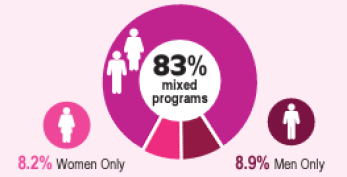

Applying interventions designed to reduce and manage the symptoms of substance use disorders.
A cell in the Alcohol Treatment Matrix. In an extreme form, the title poses the dilemma for alcohol treatment staff who may also be (seen as) working for authorities whose main role is to control or punish the ‘client’ or who may be...
A new American Cancer Society study published in the journal Tobacco Control suggests that regularly receiving personalised emails with tips for quitting amongst other information could be as effective at reducing the rate of smoking as...
Thirteen years have passed since the US Food and Drug Administration (FDA) last approved a new medication to help the nation’s millions of people with alcohol use disorder (AUD) stop or moderate their drinking.
Only 3 such formulations...
Background
Screening and brief interventions for alcohol are an effective public health measure to tackle alcohol-related harm, however relatively few countries across the European Union (EU) have implemented them widely. This may be due...
Νέα έρευνα που δημοσιεύθηκε στο Journal of Neural Transmission επισημαίνει μια σειρά από πιθανές ανεπιθύμητες παρενέργειες από τη χρήση του διεγερτικού φαρμάκου Ritalin χωρίς ιατρική συνταγή. Η ριταλίνη (μεθυλφαινιδάτη) χρησιμοποιείται...
The final row of the Alcohol Treatment Matrix enters the domain of treatment organised not primarily for the patient, but to safeguard the wider community, encountering what seems a core contradiction depicted on the cover of WHO guidance...
A free online training course from the Centers for Disease Control and Prevention (CDC) is now available.
The course addresses the CDC recommendations with respect to the prescription of opioids for chronic pain as well as their...
Αυτή η έκθεση συγκεντρώνει πληροφορίες σχετικά με άτομα που υποβάλλονται σε εξειδικευμένες παρεμβάσεις για προβλήματα ναρκωτικών και για προβλήματα κατανάλωσης οινοπνεύματος στην Αγγλία, εκτός από τους ασθενείς που λαμβάνουν αυτή τη...
What is already known about this topic?
The United States has experienced a sharp increase in hepatitis C virus (HCV) incidence that can be attributed to injection drug use. Some states have used public health laws and...
Μια πρόσφατα δημοσιευμένη Λευκή Βίβλος από το Κέντρο Μεταφοράς Τεχνολογίας Εθισμού Newtork (ATTC) ξεκινά με την παραδοχή ότι το εργατικό δυναμικό πρόληψης, θεραπείας και αποκατάστασης της διαταραχής χρήσης ουσιών (SUD) υφίσταται επί του...
A new study published in the Journal of Addiction Medicine suggests that a tele-psychiatric approach which uses video-link technology in combination with medicinal treatment in the form of buprenorphine could be as effective as the usual...
Το Καναδικό Κέντρο για την Κατάχρηση Ουσιών (CCSA) δημοσίευσε μια νέα έκθεση που περιγράφει λεπτομερώς τις πιθανές επιπτώσεις των ψυχοδραστικών συνταγογραφούμενων φαρμάκων κατά την οδήγηση .
Συνήχθησαν τα ακόλουθα συμπεράσματα:
The European Facility Survey Questionnaire (EFSQ) can be used for data collection in any country by those looking to investigate facilities that provide interventions for drug users.
Its aim is to collect information on facilities in...
Νέα έρευνα που δημοσιεύθηκε στο Journal of Clinical Psychiatry διαπίστωσε ότι τα άτομα με διαλείπουσα εκρηκτική διαταραχή (IED) - μια κατάσταση με σημαντική γενετική συνιστώσα που χαρακτηρίζεται από τακτικές εκρήξεις επιθετικότητας, είτε...
The Talking Route to Recovery
Time to consolidate the lessons of last five instalments of the online course on alcohol treatment research. Every treatment involves direct or indirect human interaction, but this row is about therapies in...
Psychosocial interventions are psychological or social interventions used to tackle issues related to substance abuse and behavioural addictions. They can be employed to identify and treat problems, as well as to assist with user...
New research published in The Lancet Public Health suggests that global smoking rates have decreased by 2.5% following the introduction of the global tobacco control treaty. The treaty obligates the 180 countries committed to it to...
New research by scientists at The Scripps Research Institute (TSRI) may lead to the development of personalised treatments for alcohol dependence. The study evaluated how people’s responses in the brain differ to various therapeutic...
Η κοκαΐνη ασκεί τα συμπεριφορικά διεγερτικά αποτελέσματά της διευκολύνοντας τις συναπτικές δράσεις των νευροδιαβιβαστών όπως η ντοπαμίνη και η σεροτονίνη. Είναι επίσης νευροτοξικό και γενικά κυτταροτοξικό, οδηγώντας σε...
Working with mice, researchers at Johns Hopkins have contributed significant new evidence to support the idea that high doses of cocaine kill brain cells by triggering overactive autophagy, a process in which cells literally digest their...
Share the Knowledge: ISSUP members can post in the Knowledge Share – Sign in or become a member